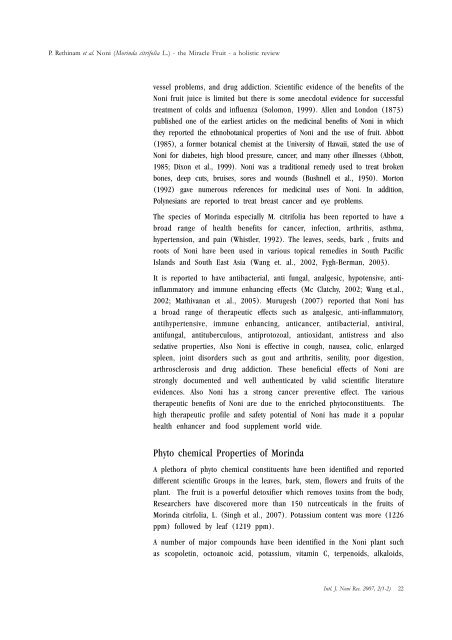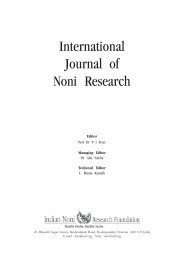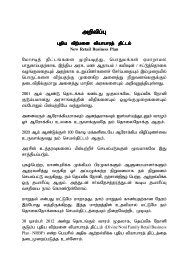International Journal of Noni Research - Noni Family
International Journal of Noni Research - Noni Family
International Journal of Noni Research - Noni Family
Create successful ePaper yourself
Turn your PDF publications into a flip-book with our unique Google optimized e-Paper software.
P. Rethinam et al. <strong>Noni</strong> (Morinda citrifolia L.) - the Miracle Fruit - a holistic review<br />
vessel problems, and drug addiction. Scientific evidence <strong>of</strong> the benefits <strong>of</strong> the<br />
<strong>Noni</strong> fruit juice is limited but there is some anecdotal evidence for successful<br />
treatment <strong>of</strong> colds and influenza (Solomon, 1999). Allen and London (1873)<br />
published one <strong>of</strong> the earliest articles on the medicinal benefits <strong>of</strong> <strong>Noni</strong> in which<br />
they reported the ethnobotanical properties <strong>of</strong> <strong>Noni</strong> and the use <strong>of</strong> fruit. Abbott<br />
(1985), a former botanical chemist at the University <strong>of</strong> Hawaii, stated the use <strong>of</strong><br />
<strong>Noni</strong> for diabetes, high blood pressure, cancer, and many other illnesses (Abbott,<br />
1985; Dixon et al., 1999). <strong>Noni</strong> was a traditional remedy used to treat broken<br />
bones, deep cuts, bruises, sores and wounds (Bushnell et al., 1950). Morton<br />
(1992) gave numerous references for medicinal uses <strong>of</strong> <strong>Noni</strong>. In addition,<br />
Polynesians are reported to treat breast cancer and eye problems.<br />
The species <strong>of</strong> Morinda especially M. citrifolia has been reported to have a<br />
broad range <strong>of</strong> health benefits for cancer, infection, arthritis, asthma,<br />
hypertension, and pain (Whistler, 1992). The leaves, seeds, bark , fruits and<br />
roots <strong>of</strong> <strong>Noni</strong> have been used in various topical remedies in South Pacific<br />
Islands and South East Asia (Wang et. al., 2002, Fygh-Berman, 2003).<br />
It is reported to have antibacterial, anti fungal, analgesic, hypotensive, antiinflammatory<br />
and immune enhancing effects (Mc Clatchy, 2002; Wang et.al.,<br />
2002; Mathivanan et .al., 2005). Murugesh (2007) reported that <strong>Noni</strong> has<br />
a broad range <strong>of</strong> therapeutic effects such as analgesic, anti-inflammatory,<br />
antihypertensive, immune enhancing, anticancer, antibacterial, antiviral,<br />
antifungal, antituberculous, antiprotozoal, antioxidant, antistress and also<br />
sedative properties, Also <strong>Noni</strong> is effective in cough, nausea, colic, enlarged<br />
spleen, joint disorders such as gout and arthritis, senility, poor digestion,<br />
arthrosclerosis and drug addiction. These beneficial effects <strong>of</strong> <strong>Noni</strong> are<br />
strongly documented and well authenticated by valid scientific literature<br />
evidences. Also <strong>Noni</strong> has a strong cancer preventive effect. The various<br />
therapeutic benefits <strong>of</strong> <strong>Noni</strong> are due to the enriched phytoconstituents. The<br />
high therapeutic pr<strong>of</strong>ile and safety potential <strong>of</strong> <strong>Noni</strong> has made it a popular<br />
health enhancer and food supplement world wide.<br />
Phyto chemical Properties <strong>of</strong> Morinda<br />
A plethora <strong>of</strong> phyto chemical constituents have been identified and reported<br />
different scientific Groups in the leaves, bark, stem, flowers and fruits <strong>of</strong> the<br />
plant. The fruit is a powerful detoxifier which removes toxins from the body,<br />
<strong>Research</strong>ers have discovered more than 150 nutrceuticals in the fruits <strong>of</strong><br />
Morinda citrfolia, L. (Singh et al., 2007). Potassium content was more (1226<br />
ppm) followed by leaf (1219 ppm).<br />
A number <strong>of</strong> major compounds have been identified in the <strong>Noni</strong> plant such<br />
as scopoletin, octoanoic acid, potassium, vitamin C, terpenoids, alkaloids,<br />
Intl. J. <strong>Noni</strong> Res. 2007, 2(1-2) 22








